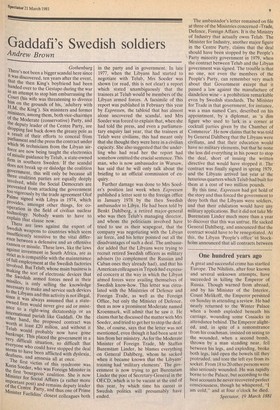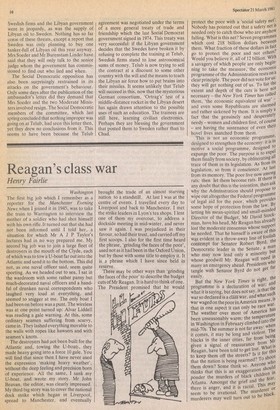Gaddafi's Swedish soldiers
Andrew Brown
Gothenburg There's not been a bigger scandal here since it was discovered, ten years after the event, that the then King's boyfriend had been handed over to the Gestapo during the war in an attempt to stop him embarrassing the Court (his wife was threatening to divorce him on the grounds of his, `adultery with li:M. the King'). Six ministers and former ministers, among them, both vice-chairmen of the Moderate (conservative) Party, and the deputy leader of the Centre Party, are dropping fast back down the greasy pole as a result of their efforts to conceal from parliament and the press the contract under Which 96 technicians from the Libyan airforce are now being taught the electronics of missile guidance by Telub, a state-owned fuln in southern Sweden.' If the scandal does not break up or dislodge the coalition government, this will only be because all three coalition parties are equally deeply involved, while the Social Democrats are prevented from attacking the government too vigorously by the trade agreement 01of Palme signed with Libya in 1974, which provides, amongst other things, for cooperation in the field of civilian nuclear technology. Nobody wants to have to explain that clause now. There are laws against the export of Swedish weapons to countries which seem insufficiently sensitive to the vital difference between a defensive and an offensive cannon or missile. These laws, like the laws against investment in South Africa, are as strict as is compatible with the maintenance of full employment at the Swedish factories involved. ButTelub, whose main business is making the sort of electronic devices that the Swedish armed forces need in their missiles, is only selling the knowledge necessary to make and service such devices to the Libyans and this activity is not illegal, since it was always assumed that a stateowned firm would never give aid or assistance to a right-wing dictatorship or an international pariah like Gaddafi. On the Other hand, the proposed contract was worth at least £20 milion, and without it Telub would probably now have gone bankrupt. This placed the government in a very difficult situation, so difficult that everyone who could have stopped the deal seems to have been afflicted with dyslexia, deafness, and amnesia all at once. The first victim of this syndrome was Karin Soeder, who was Foreign Minister in the first 'bourgeois' coalition. She is now Minister for Social Affairs (a rather more important post) and remains deputy leader of the Centre Party, and thus one of Prime Minister Faelldins' closest colleagues both in the party and in government. In late 1977, when the Libyans had started to negotiate with Telub, Mrs Soeder was shown (or read, this is not clear) a report which stated unambiguously that the trainees at Telub would be members of the Libyan armed forces. A facsimile of this report was published in February this year by Expressen, the tabloid that has almost alone uncovered the scandal, and Mrs Soeder was forced to explain that, when she had told the press, and even a parliamentary enquiry last year, that the trainees at Telub were civilians, this had meant only that she thought they were here in a civilian capacity. She also suggested that the underling who had read her the report had somehow writhed the crucial sentence. This man, who is now ambassador in Warsaw, has said that he will only talk about the briefing to an official commission of enquiry. Further damage was done to Mrs Soeder's position last week when Expressen published a letter sent to the foreign office in January 1978 by the then Swedish ambassador to Libya. He had been told by Benkt Dahlberg, a retired major-general who was then Telub's managing director, and whom the politicians involved have tried to use as their scapegoat, that the company was negotiating with the Libyan air force, and his letter pointed out all the disadvantages of such a deal. The ambassador added that the Libyans were trying to recruit retired Swedish officers as military advisers (to complement the Russian and Cuban ones they already had), and that his American colleagues in Tripoli had expressed concern at the way in which the Libyan aimed forces were availing themselves of Swedish know-how. This letter was circulated with the Ministries of Defence and Foreign Trade, as well as the Foreign Office, but only the Minister of Defence, then as now a prominent Moderate named Kroenmark, will admit that he saw it. He claims that he discussed the matter with Mrs Soeder, and tried to get her to stop the deal.
She, of course, says that the letter was not mentioned, even though it had been sent to him from her ministry. As for the Moderate Minister of Foreign Trade, Mr Staffan Burenstam Linder, he blames everything on General Dahlberg, whom he sacked when it became known that the Libyans' training had 'military elements'. The gov ernment is now trying to get Burenstam Linder the post of Secretary-General in the OECD, which is to be vacant at the end of this year, by which time his career in Swedish politics will presumably have ended. The ambassador's letter remained on file at three of the Ministries concerned —Trade, Defence, Foreign Affairs. It is the Ministry of Industry that actually owns Telub. The Minister for Industry, another major figure in the Centre Party, claims that the deal should have been stopped by the People's Party minority government in 1979, when the contract between Telub and the Libyan government was signed. The trouble is that no one, not even the members of the People's Party, can remember very much about that Government gxcept that it passed a law against the manufacture of dandelion wine — a prohibition remarkable even by Swedish standards. The Minister for Trade in that government, for instance, was a man named Cars, described on his appointment, by a diplomat, as 'a dim figure who used to lurk in a corner at cocktail parties given by the Chamber of Commerce'. He now claims that he was told by General Dahlberg that the Libyans were civilians, and that their education would have no military elements, but that he none the less did everything in his power to stop the deal, short of issuing the written directive that would have stopped it. The contract was finally signed in spring 1979, and the Libyans arrived last year at the luxurious quarters which Telub had built for them at a cost of two million pounds.
By this time, Expressen had got hold of the story and thus forced the government to deny both that the Libyans were soldiers, and that their edikation would have any military applications. But it did not take Mr Burenstam Linder much more than a year to discover that this was untrue. He sacked General Dahlberg, and announced that the contract would have to be renegotiated. At this, the Libyan 'People's office' in Stockholm announced that all contracts between Swedish firms and the Libyan government were in jeopardy, as was the supply of Libyan oil to Sweden. Nothing has so far come of these threats, except a report that Sweden was Only planning to buy one tanker-full of Libyan oil this year anyway. Mrs Soeder and Mr Burenstam Linder have said that they will only talk to the senior judge whom the government has commissioned to find out who lied and when.
The Social Democratic opposition has also been surprisingly restrained in its attacks on the government's behaviour. Only some days after the publication of the ambassador's letter did they demand that Mrs Soeder and the two Moderate Ministers involved resign. The Social Democratic members of the committee, which last spring concluded that nothing improper was going on at Telub, had seen this letter then, yet they drew no conclusions from it. This seems to have been because the Telub agreement was negotiated under the terms of a more general treaty of trade and friendship which the last Social Democrat government signed in 1974. This treaty was very successful: if the Libyan government decides that the Swedes have broken it by refusing to complete the training at Telub, Swedish firms stand to lose astronomical sums of money. Telub is now trying to sell the contract at a discount to some other country with the will and the means to teach the Libyan air force how to put brains into their missiles. It seems unlikely that Telub will succeed in this, now that the mysterious German consortium. `Ortrag's' test of a middle-distance rocket in the Libyan desert has again drawn attention to the possible uses of such an education. The trainees are still here, learning civilian electronics. Perhaps they are blessing the government that posted them to Sweden rather than to Chad.







































 Previous page
Previous page